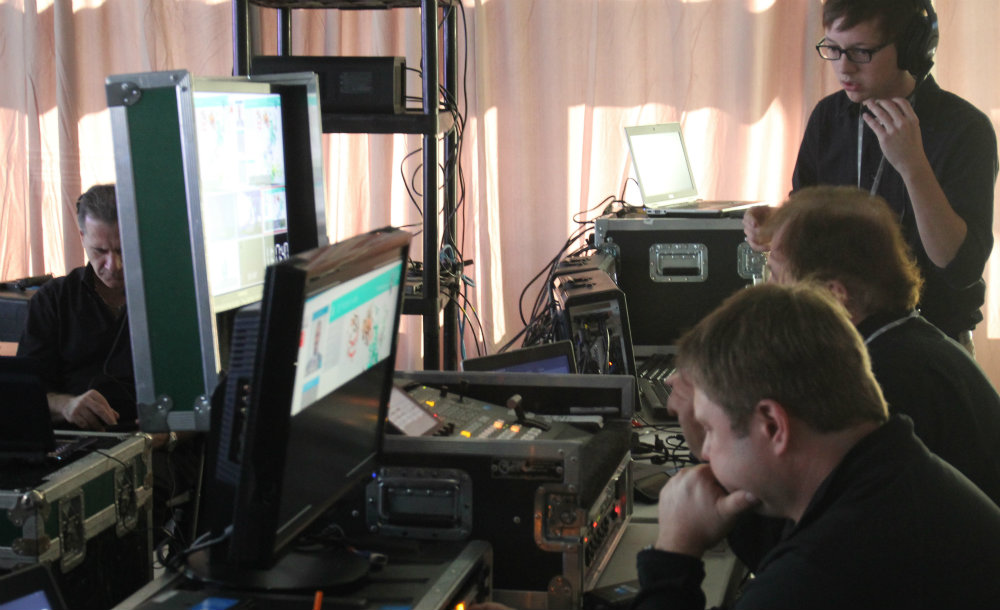Why Should You “Dress Up” Your Event Stage?
Event planners know there is much more to hosting an event than picking a location and setting up chairs. In some cases, the appearance of the stage matters little to the event. In other cases, the backdrop makes an important brand statement as it will be seen by audiences in-person or online and may be viewed on-demand later. Equally important is whether the event might be photographed or filmed for news or media outlets.
A common approach is to have a bare-bones stage backed with a drape, which is simple and cost-effective. However, taking the extra time to dress things up a bit can make the event you’re planning much more engaging in the eyes of attendees.
Other reasons to consider something beyond a plain backdrop might include:
- Align to audience expectations: An audience expecting something different or exciting likely won’t be impressed with basic pipe-and-drape, even when well-lit.
- Create a Branded Environment: Your brand is amplified when using logos, well-designed set pieces, and visual elements that enhance your corporate “look.”
- Make it memorable: Audiences might be more likely to remember an event that uses engaging elements like an LED wall, patterned backdrop, and changing or moving lighting scenes.

3 Strategies for Dressing Up an Event Stage
Here are some tried-and-true techniques for dressing up an event stage.
1. LED Walls
LED walls come in all shapes and sizes. You’ve seen JumboTrons at stadiums and the huge walls in Times Square. Modifications to that technology give us portable forms for indoor or even outdoor use. These LED Walls create a digital canvas that is fully scalable to nearly any size, covering your stage from end to end.
LED walls are bright, attention-grabbing, and visually stunning. LED walls have many benefits, including:
- Customizability with a wide-open canvas
- Flexibility in size
- High quality
LED walls are the most expensive of your choices and require extensive pre-production and creative work. Read on for some easy-to-use, cost-effective options.
2. 3D Shapes — Backdrops
One style of 3D shape is injection-molded patterns that are hung behind the stage. These shapes create an interesting backdrop and can be lit in different ways to create unique light patterns. Changing the brightness and color of the light throughout your event creates different settings that can enhance the ongoing presentation.
Other 3D elements could include towers, totems, and design walls. These features come in different materials like stretch fabric, molded, or laser-cut plastic and metal. They are placed directly on or around the stage and can be lit from different angles to provide different scenes or looks during the event.
Other ideas to dress your event using 3D shapes include:
- Building columns away from the stage to project company colors on while the rest of the room is dark.
- Hanging objects in varying shapes from the ceiling and projecting light or moving video onto them.
- Arches that frame entryways or food-service areas

3. Flats and Sails
Sometimes referred to as “hard sets,” a smooth backdrop can be assembled behind your stage. Using a specialized frame system and a large stretch fabric, you can create a very smooth wall and decorate it in a number of ways.
First, you can have the fabric printed. Most people are familiar with a step-and-repeat design usually seen on the red carpet, but you can also print colors and patterns to suit the theme of the event. These could include rustic brick, a city skyline, or artistic shapes.
Next, you can use light and video projection to display content on the backdrop. This could include gobos, moving or rotating shapes, or projected video or presentation content.
Sails are geometric shapes — like triangles or stretched squares — attached at different points to create a unique pattern. Again, when hit with light or projection, these elements create interesting scenes for your audience.

A Final Thought
We work with all types and styles of events. The advice we give all clients is to be intentional about the setting you want to create for your presenters and your audience and how you want the event to be remembered. Pipe and drape might never be noticed, and LED walls might be considered extravagant. When you are intentionally designing your stage and creating an engaging environment, everyone will be wowed and appreciate the effort.
Over the past 30+ years, HB Live has become one of the premier audio-visual event production and technology providers.




